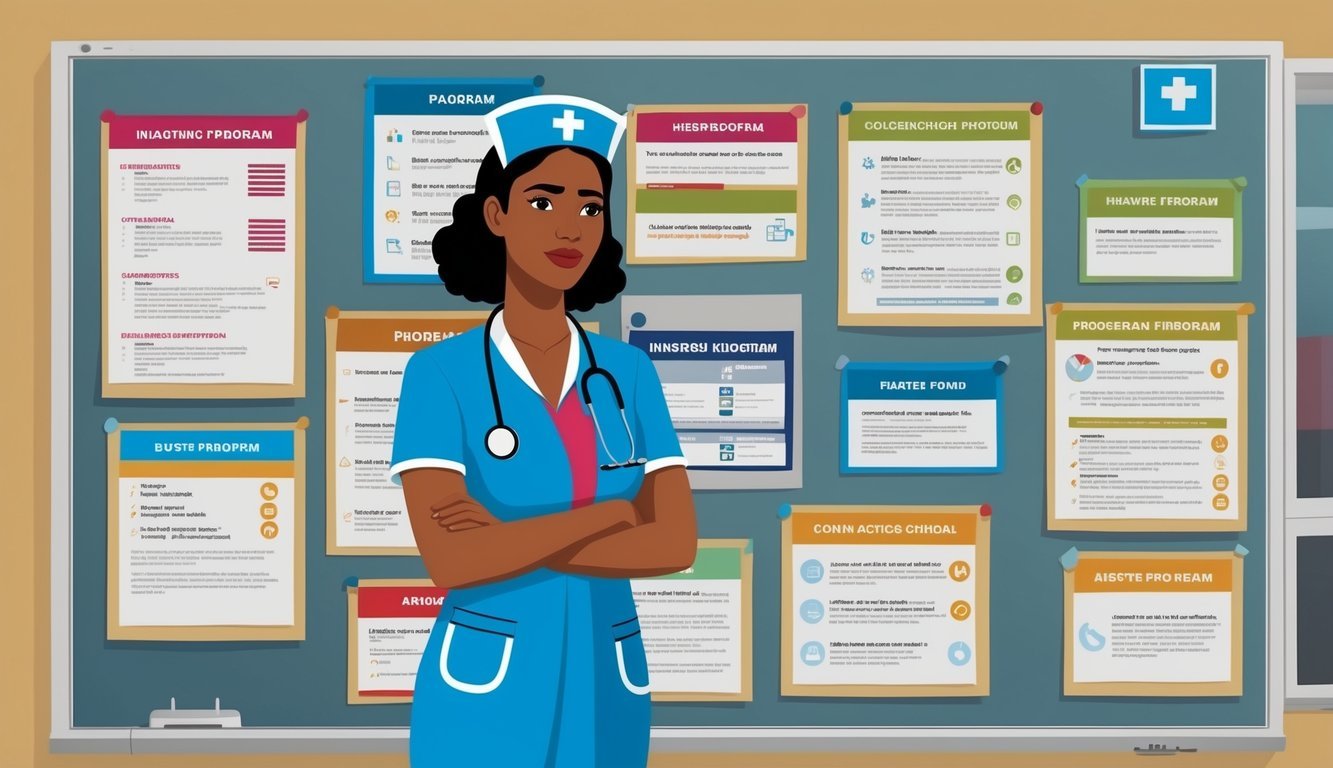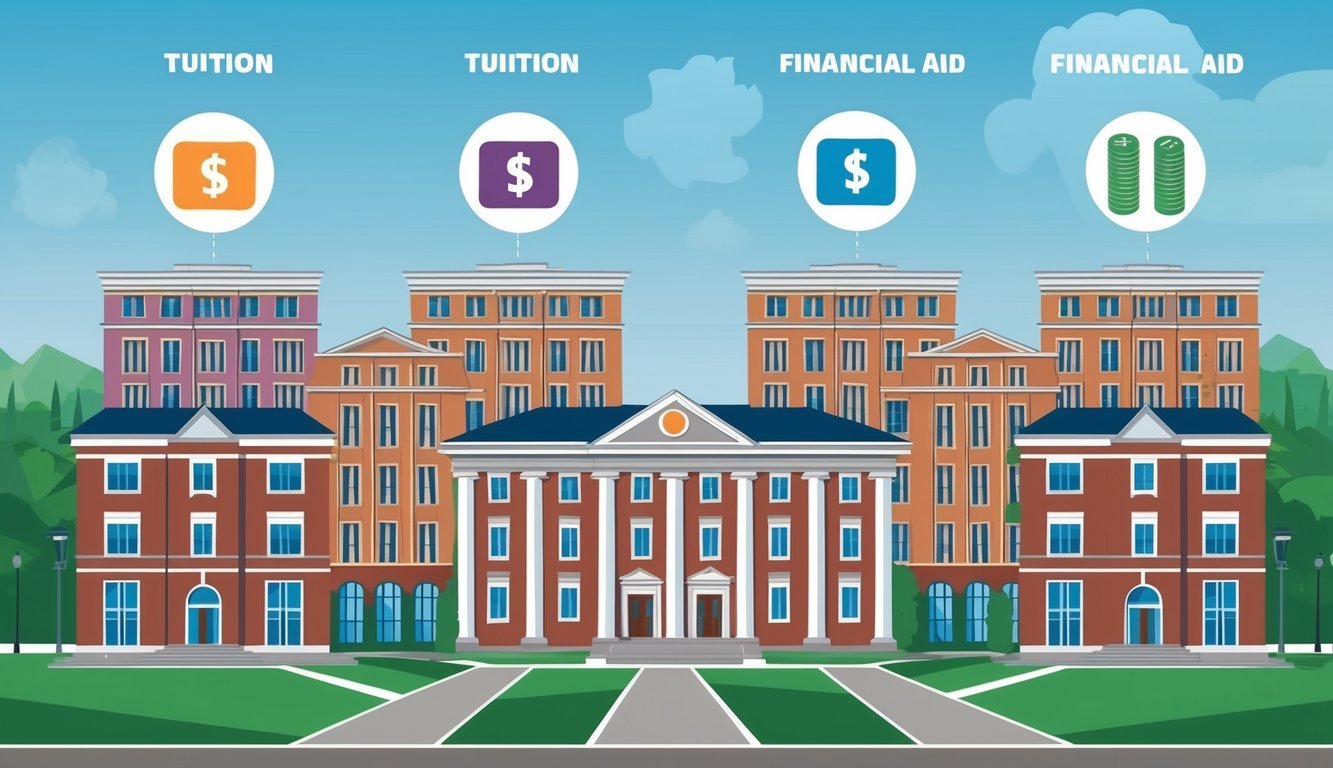If you’re considering a nursing career but are concerned about the competitive admissions process, you’re not alone.
Many aspiring nurses seek programs with high acceptance rates and manageable admission requirements.
Finding the right nursing school can set the tone for your entire educational journey.
Some nursing schools, like Rasmussen University, boast a 100% acceptance rate for qualified applicants, making them an attractive option for those looking to enter the field swiftly.
Other institutions, such as Eastern Kentucky University, also feature impressive acceptance rates upwards of 90%, allowing you to focus on your education rather than stressful application processes.
As you explore your options, understanding the requirements and what each school offers can help you make an informed decision about your nursing education.
With a variety of programs available, you can find one that aligns with your career ambitions and academic background.
Consider checking out resources like CollegeVine and NursingProcess.org for additional insights on easy nursing schools to get into.
Understanding Admission Requirements

When considering nursing schools, it is crucial to understand their specific admission requirements.
These typically include acceptance rates, essential prerequisites, and standardized testing criteria.
Familiarizing yourself with these elements will help you navigate your application process more efficiently.
Evaluating Acceptance Rate Metrics
Acceptance rates can significantly impact your choice of nursing school.
A higher acceptance rate may indicate a more accessible admission process.
For instance, Eastern Kentucky University boasts a notable acceptance rate of 94%, making it one of the easier options to consider.
Assessing acceptance rates not only informs you about your chances of getting in but also whether the school aligns with your education goals.
Research and compare various schools, such as Rasmussen University, which has a 100% acceptance rate for qualified applicants.
Essential Prerequisites for Nursing Programs
Most nursing programs have set prerequisites that you must fulfill prior to application.
Common requirements often include:
- Completed application forms
- Official transcripts showing your previous academic performance
- Letters of recommendation from instructors or professionals in the field
A solid academic background is crucial.
Having a GPA above the minimum requirement, often around 2.5 to 3.0, can enhance your application.
Each school may have distinct criteria, so it’s essential to carefully review their specific prerequisites.
Standardized Tests and Academic Records
Many nursing programs require standardized test scores as part of their admission criteria.
Tests such as the TEAS (Test of Essential Academic Skills) may be mandated.
You should also be prepared to present your academic record, which reflects your performance in relevant coursework.
Besides test scores, schools often look for strengths in science and math.
Keep a copy of your official transcripts handy, as they will be necessary for your application.
Schools like NursingProcess.org provide insights into specific test score cutoffs for various programs.
Exploring Program Options

When considering nursing education, understanding the available program options is essential.
Various pathways cater to different needs and career goals, influencing your journey in becoming a registered nurse.
Associate vs. Bachelor of Science in Nursing
An Associate Degree in Nursing (ADN) is typically a two-year program that prepares you for entry-level positions in healthcare.
This route is often less costly and quicker to complete.
Many community colleges offer ADN programs, making them accessible.
In contrast, a Bachelor of Science in Nursing (BSN) takes about four years to complete and provides comprehensive training in areas like leadership and public health.
BSN programs are often offered through universities and can enhance job opportunities and career advancement.
| Program Type | Duration | Key Focus Areas | Ideal For |
|---|---|---|---|
| ADN | 2 years | Clinical skills | Quick entry to nursing |
| BSN | 4 years | Leadership, research, critical care | Career advancement |
Online and Flexible Nursing Programs
Online nursing programs have gained popularity for their flexibility, catering to students balancing work and family commitments.
Many universities now offer ADN and BSN programs online, allowing you to complete coursework at your own pace.
For those who already have an ADN, RN-to-BSN programs provide an efficient pathway to earn a bachelor’s degree.
These programs often support online learning, which means you can study from anywhere while fulfilling clinical practice requirements locally.
Key benefits of these programs include:
- Flexibility: Adjust your study schedule.
- Accessibility: Reach programs not available locally.
- Affordability: Often lower tuition compared to traditional schools.
Accreditation and Quality of Nursing Education
Choosing an accredited program is vital for ensuring a quality education.
Look for schools accredited by the Commission on Collegiate Nursing Education (CCNE) or the Accreditation Commission for Education in Nursing (ACEN).
Attending an accredited institution not only ensures you receive a proper education but also affects your eligibility for financial aid and the ability to transfer credits.
Before enrolling, confirm the program’s pass rates for the NCLEX-RN exam.
High pass rates can be indicative of the program’s overall quality and effectiveness in preparing students for nursing careers.
Comparing Tuition Costs and Financial Aid

When considering nursing schools, tuition costs play a significant role in your decision-making process.
Many programs offer varying tuition rates, making it important to compare options.
Here’s a brief overview of tuition costs at several nursing schools:
| University/College | Tuition (per year) |
|---|---|
| WGU’s College of Health Professions | Approximately $17,510 |
| Cox College | $455/credit hour |
| Public colleges | $6,000 – $25,000 |
Affordability is essential.
Some nursing programs, like those at public colleges, may offer lower tuition compared to private institutions.
Financial aid opportunities can substantially reduce your costs.
You should explore options such as:
- Federal Grants: like the Pell Grant
- Scholarships: awarded based on merit or need
- Loans: federal and private student loans
Many schools provide financial aid workshops to help you understand your options.
Be sure to visit their financial aid offices or websites for more details on available resources.
Analyzing Clinical and Practical Training

Clinical and practical training are essential components of nursing education.
They ensure you acquire the necessary skills and experience to provide high-quality patient care.
Understanding how these experiences are structured can help you choose a nursing school that meets your educational needs.
Hands-On Clinical Experience and Rotations
Hands-on clinical experience is an integral part of nursing programs.
You will engage in clinical rotations at various healthcare facilities, including hospitals and community clinics.
This exposure allows you to apply classroom knowledge in real-world settings.
During these rotations, you might work in different departments such as pediatrics, geriatrics, and emergency care.
Each rotation provides unique insights into patient care practices and teamwork dynamics.
Most nursing schools arrange these experiences to ensure diversity in clinical exposure, which is crucial for your development.
Simulation Labs and Nursing Skills Development
Simulation labs play a vital role in nursing education.
These facilities allow you to practice essential nursing skills in a controlled setting.
Using high-fidelity mannequins and virtual simulations, you can learn techniques such as IV insertion, wound care, and patient assessment.
The structured learning in simulation labs mimics real-life scenarios, helping you build confidence before participating in clinical rotations.
Moreover, you receive immediate feedback from instructors, enhancing your learning experience.
Many programs integrate these labs with clinical training, ensuring a comprehensive educational approach.
Both clinical experiences and simulation labs work together to prepare you for a successful nursing career.
Investigating these components can help you find a program that aligns with your aspirations.
Identifying Schools with High Acceptance Rates
High acceptance rates indicate that many aspiring nursing students can secure admission.
You may want to focus on specific schools that demonstrate strong acceptance policies to facilitate your entry into nursing programs.
Colleges Known for High Acceptance Rates
Several nursing schools are recognized for their high acceptance rates.
Here are some options to consider:
| School Name | Acceptance Rate |
|---|---|
| University of St. Thomas | 91% |
| Georgia State University | 89% |
| Cox College | 33% |
| University of Wyoming | 93% |
| Delta State University | 100% |
| Keiser University | 100% |
| Sam Houston State University | 80% |
| University of New Mexico | 74% |
| University of Maine-Fort Kent | 100% |
| University of Toledo | 55% |
| University of Texas at El Paso | 75% |
| Massachusetts College of Pharmacy and Health Sciences | 100% |
These schools offer routes to nursing programs with relatively accessible entry points, enabling you to pursue your nursing career in a supportive academic environment.
Admission Criteria at Accessible Schools
Understanding the admission criteria is essential when looking for nursing programs with high acceptance rates.
Most schools require:
- A completed application
- High school diploma or equivalent
- Minimum GPA requirements (often around 2.5 to 3.0)
- Entrance exam scores (like the HESI or TEAS)
- Completion of prerequisite courses
For instance, universities like Delta State University and Keiser University have straightforward admissions processes, including personalized guidance for applicants.
By meeting basic academic expectations, you can enhance your chances of admission.
Researching these admission criteria can help you navigate the application process effectively.
Each school may have unique advantages, so consider your personal circumstances while making your decision.

